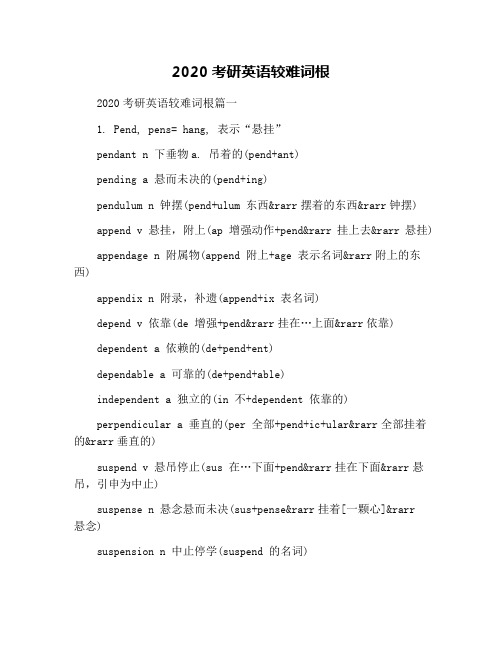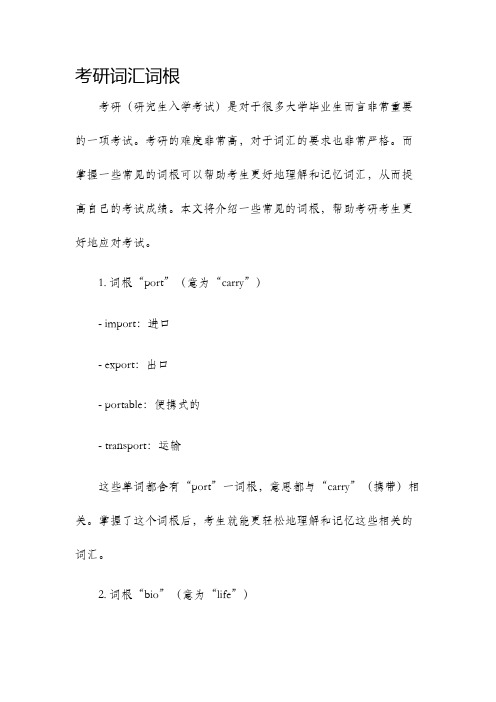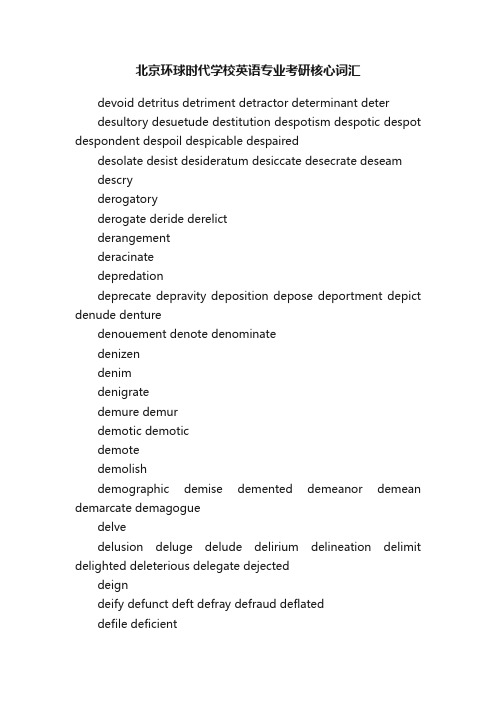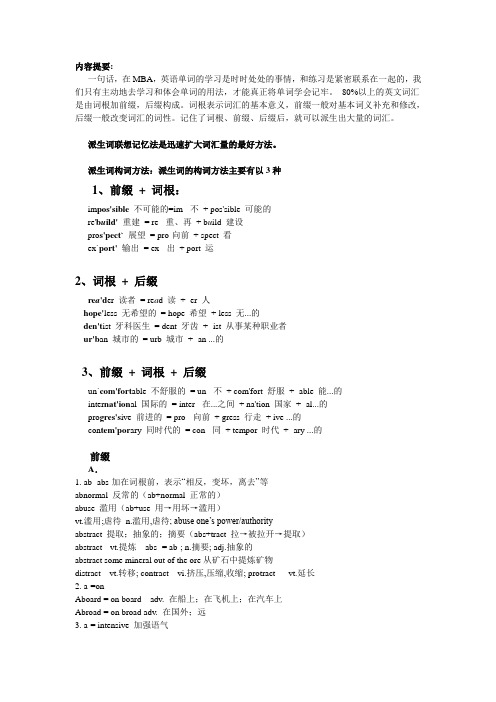戴弘梧考研词汇词根词缀总结
2024年考研英语中常见的词根词缀(通用3篇)

2024年考研英语中常见的词根词缀(通用3篇)考研英语中常见的词根词缀篇一exhibit v/n 展览显示(ex出+hibit-rarr拿来-rarr展览)exhibition n 展览,表演(exhibit+ion)exhibitionist n 爱出风头的人( exhibition+ist-rarr展览自己的人)inhibit v 制止,阻止(in不+hibit-rarr不能拿-rarr制止)inhibition n 制止,禁令(inhibit+ion)uninhibited a 不被制止的(un不+inhibit制止+ed)prohibit v 阻止,制止(pro前面+hibit-rarr在前面拿住-rarr不让前进-rarr阻止)prohibition n 制止(probibit+ion)prohibitive a 制止的,价格极贵的(prohibit制止+ive-rarr价格到了制止人买的地步)"=earth,表示“土,地”"humble a 谦恭的下贱的(hum+ble-rarr接近地面-rarr谦恭的)humility n 谦让低下(hum+ility状态-rarr地的状态-rarr低下)humiliate v 羞辱,侮辱(hum+iliate使…使人到地上-rarr羞辱别人)humiliation nn 耻辱(humiliate+ion)inhume v 埋葬(in进入+hume-rarr进入土中)exhume v 掘出(ex 出+hume-rarr出土-rarr掘出)posthumous a 死死的,遗腹的(post后+hum土,引申为死+ous-rarr死后的)hummock n 小圆丘(hum+mock圆丘-rarr土丘)human n 人类(传说人是由土造出的)humane a 有人情的,仁爱的(humane+e-rarr有人情的)",hydro= water,表示“水”"hydrous a 含水的,水状的(hydr+ous)anhydrous a 无水的(an无+hydrous-rarr无水的)dehydrate v 脱水(de去掉+hydr+ate-rarr去掉水)carbohydrate n 碳水化合物(carbo碳+hydr+are)hydrate v 水化n. 水合物(hydr+ate-rarr变成水,水化) hydrant n 水龙头(hydr+ant)hydroelectric a 水力发电的(hydro+electric电)hydroplane n 水上飞机(hydro+plane飞机)hydropower n 水力发电(hydro+power电力)",ideo=idea,表示“思想,观点”"ideal n 理想(idea+al)idealism n 唯心(idal+ism-rarr理想,唯心)idealize b 理想化(ideal+ize)ideate b 想象,设想(idea+ate-rarr思想-rarr设想) ideograph n 表意文字(ideo+graph-rarr写思想的字-rarr表意文字)ideology n思想体系(ideo+logy体系,学科-rarr思想体系,意识形态)ideolonical a 思想上的(ideology+ical)"=go,表示“行走”"exit n 出口,出去(ex出+it-rarr走出,出口)ambition n 雄心,志向(amb大+it+ion-rarr走大步-rarr雄心)ambitious a 有雄心的(amb+it+ious)initial a 开始的,最初的(in进入+it+ial-rarr走进-rarr开始的)initiate v 开始创始(in+it+iate)initiative a 起步的n. 原动力(initiate开始+ive)transitory a短暂的(trans交换+it+ory交换走-rarr你走他来-rarr短暂的)transition n 过渡,转变(trans交换+it+ion-rarr交换走-rarr过渡)itinerant a 巡回的(itiner是it变体+ant-rarr走的-rarr走来走去的)itinerary n 旅行安排,旅程(itiner+ary)circuit n 环行电路(circu环+it-rarr环着走-rarr环行)sedition n 叛乱,煽动叛乱(sed[=se分开]+it+ion-rarr分开走-rarr叛乱)seditious a 煽动叛乱的(sed+it+ious)考研英语中常见的词根词缀篇二"=.go,walk,表示“行走”"aggression n 侵略,攻击(ag再-rarrgress+ion-rarr走了还走-rarr攻击侵略)aggressive a 侵略的进取的(ag+gress+ive)congress n 国会,代表大会(con共同+gress-rarr走到一起-rarr代表大会)degress v 离题(di偏离+gress-rarr走偏离-rarr离题) digression n 离题,枝节话(digress+ion)progress n 进步进展(pro向前+gress-rarr向前走-rarr 前进)progressive a 进步的(progress+ive)transgress n 超过违犯(trans横+gress-rarr横着走-rarr违犯)transgression n 违法(transgress+ion)egress n 出口,出路(e 出+gress-rarr走出-rarr出口) ingress n 进口,入场(in进+gress-rarr走进-rarr进口)retrogress v 倒退,退步(retro向后+gress-rarr倒退) ",gynec=woman,表示“妇女”"gynarchy n 妇女专政(grn+archy统治)androgyny n 半男半女(andro男+gyny女-rarr____)monogyny n 一妻制(mono一个+gyny-rarr一个女人-rarr 一妻制)misogynist n 厌恶女人者(miso恨+gynist-rarr恨女人者)philogynist n 喜欢女人者(phito爱+gyn+-rarr爱女人者)gynecology n 妇科学(gyneco+logy学科)"=dwell,表示“居住”"habit n 习惯(住一个地方-rarr习惯了)habituate v 使习惯于(habit习惯+uate)habitual a 惯常的(habit+ual)habitant n 居住者(habit+ant人-rarr住的人)habitat n (动植物)居住地(habit+at表示地方-rarr住的地方)cohabit v 同居(co 共同+habit-rarr共同住一起)inhabit v 居住(in里面+habit-rarr住里面-rarr居住) inhabitant n 住户,居民(inhabit+ant)uninhabited a杳无人迹的(un无+inhabit居住+ed -rarr无人居住的)"=chance,表示“时机,运气”"perhaps ad. 也许,可能(per全部+haps-rarr全是时机[决定]-rarr也许)happen v 发生(hap+pen表动词-rarr时机来了-rarr发生)happy a 幸运的幸福的(hap+py-rarr有运气的-rarr幸福的)happihess n 幸福(happy+ness)mishap n 不幸,灾祸(mis 坏+hap-rarr坏运气-rarr不幸)hapless a 运气不好的(hap+less无-rarr无运气的)haphazard a 偶然的无方案的(hap+hazard游戏-rarr运气+游戏-rarr偶然的)",hes=stick,表示“粘附”"adhere v 粘着,依附(ad增加+here-rarr粘上)adherence n 粘附坚持(adhere+ence)adherent n 归依者,门徒(adhere+ent-rarr粘着坚持的人)adhesion nn 粘着坚持(ad+hes+ion)adhesive a 发粘的n.胶带(ad+hes+ive)cohere v 粘着连接(co共同+here-rarr共同粘-rarr连接)coherent a 连接的有条理的(cohere+ent)cohesion n "结合,凝聚力(co+hes+ion,cohere的名词)"inherent a 天赋的,生来的(in里面+her+ent-rarr天生[与身体内]连着-rarr天赋的)hesitate v 踌躇,犹豫(hest+itate粘粘糊糊-rarr犹豫) hereditary a 承袭的,世袭的,遗传的heritability n 可遗传性,遗传性hesitation n 踌躇,犹豫(hesitate+ion)考研英语中常见的词根词缀篇三"=throw,cast,表示“投掷,扔”"adjective a 附加的n. 形容词(ad增加+ject+ive-rarr 扔上去的-rarr附加的)abject a可怜的颓丧的( ab向下+ject+-rarr向下扔-rarr情绪颓丧的)conjecture n 推测,猜想(con共同+ject+ure-rarr大家一起扔[思想]-rarr推测)deject v 使沮丧(de向下+ject-rarr情绪向下扔-rarr 沮丧)dejected a 情绪低落的(deject+ed)eject v 喷出驱逐(e出+ject-rarr扔出-rarr喷出)ejection n 喷出排出物(eject+ion)interjection n 感慨词(inter在中间+ject+ion-rarr在句子中扔出的字-rarr感慨词)inject v 注射(in进+ject-rarr扔进去-rarr注射)object n 物体目的v. 反对(ob反+ject-rarr反着扔-rarr反对,引申为扔向目的)objection n 反对(object反对+ion)objective a 客观的n. 目的(object+ive)project v 投射n. 设计目的(pro向前+ject-rarr向前扔-rarr目的工程)projection n 投射放映(project+ion)projectile n 抛射物导弹(project+ile物体-rarr向前扔的物体)trajectory n 弹道轨道(tra穿过+ject+ory-rarr扔进去-rarr弹道)subject n 主题,主观a. 服从的(sub在…下面+ject_-rarr扔下去-rarr服从的,扔下去让大家讨论的主题) subjection n 服从,臣服(sbject+ion)subjectivity n 主观性(subject主观+ivity)reject v 回绝,驳回(re回+ject-rarr扔回来-rarr回绝)rejection n 回绝(reject+ion)",judic=judge,表示“判断”"judgment n 判断,判断力(judg+ment)adjudge v 判决,裁决(ad一再+judge-rarr一再判断-rarr裁决)prejudge v 预先断定(pre预先+judge)judicial a 司法的法官的(judic判断-rarr法官-rarr 司法的)judiciary a 法院的n. 司法部(judici+ary)judicious a 明智的有判断力的(judic+ious-rarr有判断力的)injudicious a 不明智的(in不+judicious)prejudice n 偏见(pre预先+judice-rarr预先判断-rarr 偏见)adjudicate v 判决,裁决(ad一再+judic+ate-rarr一再判断-rarr裁判)",join=join,表示“结合,连接”"junction n 接合,交汇点( junct+ion)juncture n 接合,连接(junct+ure)adjunct n附属物助手(ad增加+junct-rarr加上连接-rarr附属物助手)conjunction n结合连接词(con共同+junct+ion-rarr共同连上-rarr结合)conjuncture n (事情同时发生的)关头,危机时刻(con共同+juncture连接点-rarr所有事连到一起-rarr关键时刻) disjunction n 别离折断(dis分开+junction-rarr连接分开-rarr别离)injunction n 命令,制止(in不+junction-rarr不让连接-rarr制止令)subjunctive n 虚拟语气的(sub在下面+junct+ive-rarr 下面[似乎]连着-rarr不肯定-rarr虚拟的)joint n 关节连接adjoin v 毗连,接壤(ad一再+join-rarr一再连上-rarr 毗连)adjoining a 毗邻的(adjoin+ing)disjoin v 分开,拆散(dis分开+join-rarr连接分开) disjointed a 脱节的散乱的(disjoint+ed-rarr分开的-rarr脱节的)enjoin v 命令,吩咐(en进入+join-rarr进入连接-rarr 命令人[参加])rejoin v 再结合,重聚(re再+join-rarr再连接)rejoinder n 答复,辩论(re反+join+der-rarr反过来接-rarr答复)subjoin v (在末尾)添加,增补(sub在下面+join-rarr 在下面接上-rarr增补)第 11 页共 11 页。
考研英语高效记忆词汇之必备高频词根(二)

考研英语高效记忆词汇之必备高频词根(二)考研英语高效记忆词汇之必备高频词根(二)很多同学提到记单词就头疼,感觉单词总也背不完、记不会,实际上英文的构词与中文的偏旁部首有着异曲同工之妙,要想快速牢固记忆,就要学会利用词根、词缀知识来解构单词,从而在理解中分析单词、记忆单词。
掌握相应的词根、词缀和单词构成知识,就可以以一带十,用四两拨千金的“巧力”记住海量单词。
基于考研英语的大纲词汇及高频词汇,为了提高各位同学的英语词汇记忆效率,请同学们率先从以下词根串联起的必考词汇入手学习,从而使自己的词汇学习由多变少,由生变熟,由难变易,使学习英语单词成为一种乐趣、一种富有成就感的事情。
词根:fer = bring, carry带,拿1. confer助记:con(共同)+ fer(带,拿)→大家都带来观点→协商释义:v.协议,协商,赠与,授予举例:He conferred with Hill and others in his office.他和希尔以及他办公室里的其他人进行了商议。
2. infer助记:in(进入)+ fer(带来,拿来)→带来[意义]→推断释义:v.推断举例:I inferred from what she said that you have not been well.我从她的话里推断出你身体一直不大好。
3. offer助记:of(一再)+ fer(带来,拿来)→一再带来→提供释义:n. v.提供,出价,提议举例:Rhys offered him an apple.里斯给他一个苹果。
4. prefer助记:pre(在…前的,预先)+ fer(带来)→先带来→更喜欢释义:v.更喜欢,宁愿举例:Does he prefer a particular sort of music? I much prefer jazz to rock music.他有特别喜欢的音乐吗?我喜欢爵士乐远胜过摇滚乐。
2020考研英语较难词根

2020考研英语较难词根2020考研英语较难词根篇一1. Pend, pens= hang, 表示“悬挂”pendant n 下垂物a. 吊着的(pend+ant)pending a 悬而未决的(pend+ing)pendulum n 钟摆(pend+ulum 东西&rarr摆着的东西&rarr钟摆)append v 悬挂,附上(ap 增强动作+pend&rarr挂上去&rarr悬挂)appendage n 附属物(append 附上+age 表示名词&rarr附上的东西)appendix n 附录,补遗(append+ix 表名词)depend v 依靠(de 增强+pend&rarr挂在…上面&rarr依靠)dependent a 依赖的(de+pend+ent)dependable a 可靠的(de+pend+able)independent a 独立的(in 不+dependent 依靠的)perpendicular a 垂直的(per 全部+pend+ic+ular&rarr全部挂着的&rarr垂直的)suspend v 悬吊停止(sus 在…下面+pend&rarr挂在下面&rarr悬吊,引申为中止)suspense n 悬念悬而未决(sus+pense&rarr挂着[一颗心]&rarr悬念)suspension n 中止停学(suspend 的名词)impending a 即将发生的(im 进入+pend+ing&rarr挂进来&rarr 即将发生的)2. Pend,pens, pond= weight, expend, 表示“称重量,称称子”,引申为“花费”expend v 花费(ex 出+pend&rarr花钱出去)expenditure n 支出,开开(expend+iture)expensive a 昂贵的(ex+pens+ive&rarr要花钱的&rarr昂贵的)pension n 年金养老金(pens+ion&rarr用心花费的)compensate v 赔偿报酬(com 全部+pens+ate&rarr花费的钱全部[拿回来]&rarr赔偿)recompense v/n 回报,报答(re 回+compense 报酬&rarr回报)dispense v 分配,分送(dis 分开+pense&rarr分开花费&rarr分配,分送[财物])dispensable a 可分配的不重要的(dispense+able&rarr能分送出去&rarr不重要的)dispensary n 药房(dispense 分配+ary 场地&rarr配药的地方)propensity n 倾向习性(pro 前+pens+ity&rarr重量偏向一边&rarr倾向)pensive a 思考的(pens+ive&rarr称重量&rarr衡量&rarr思考)perpendicular v 考虑,细思(per 全部+pend&rarr全部衡量)ponder v 沉思(pond 重+er&rarr分出轻重&rarr沉思)ponderance n 重要(ponder 重+ance)ponderous a 重的,笨重的(ponder 重+ous)3.per=try,表示“尝试”peril v 冒险n. 危险(per+il&rarr尝试&rarr冒险)perilous a 危险的(peril+ous)empiric n 经验主义者(em 出+pri[=per]+ic&rarr从尝试出来&rarr经验)empirical a 靠经验办事的(empiric+al)empiricism n 经验主义( empiric 经验主义者+ism)experience n 经验,经历(ex 出+per+ience&rarr尝试出来的东西&rarr经验)experiment n 实验(ex 出+per+i+ment)2020考研英语较难词根篇二例1:2009&mdashText3: The Japanese workforce is better disciplined.日本的劳动力受过更好的训练。
考研常用词根词缀doc资料

se-
分离
separation分离;secure安全;segregation隔离,分开
un-
加在形、副、名词前
not否定
unpredictable无法预言的;unknown未知的
后
缀
-proof
加在名词后
(adj.)防……的,
waterproof防水的;
缀
-en
加在形容词前或后
(v.)make使变成……
harden使硬;
lengthen使变长;
weaken使变弱;
broaden加宽;
-ify
加在名词、形容词后
(v.)cause to become
使……成,使……化
magnify放大;
simplify简化;
purify提纯;
certify证明;
glorify颂扬;
mal-
bad,badly恶,不良
maltreat虐待;malfunction机能失常;
malcontent不满的;malnutrition营养不良;
maladminister对……管理不善
mis-
bad,badly错,坏
mistake错误
non-
not否定
nonmetal非金属;
non-ferrous非铁的;
Americanize美国化;popularize推广
-ate
(v.)使成为
activate使活动
4.表示数字的常用词缀:
数
字
数
字
前
缀
前
缀
词缀
位置
意义
考研词汇词根

考研词汇词根
考研(研究生入学考试)是对于很多大学毕业生而言非常重要的一项考试。
考研的难度非常高,对于词汇的要求也非常严格。
而掌握一些常见的词根可以帮助考生更好地理解和记忆词汇,从而提高自己的考试成绩。
本文将介绍一些常见的词根,帮助考研考生更好地应对考试。
1. 词根“port”(意为“carry”)
- import:进口
- export:出口
- portable:便携式的
- transport:运输
这些单词都含有“port”一词根,意思都与“carry”(携带)相关。
掌握了这个词根后,考生就能更轻松地理解和记忆这些相关的词汇。
2. 词根“bio”(意为“life”)
- biology:生物学
- biography:传记
- biosphere:生物圈
- antibiotic:抗生素
以上单词中的“bio”都是来源于希腊语的词根,意思都与“life”(生命)有关。
通过了解这个词根,考生可以更快地理解和记忆这
些相关的词汇。
3. 词根“auto”(意为“self”)
- automobile:汽车
- automatic:自动的
- autonomy:自治
- autobiography:自传
以上单词都含有“auto”一词根,意思都与“self”(自己)相关。
理解了这个词根,考生可以更好地掌握这些单词的含义。
4. 词根“tele”(意为“far”)。
北京环球时代学校英语专业考研核心词汇

北京环球时代学校英语专业考研核心词汇devoid detritus detriment detractor determinant deterdesultory desuetude destitution despotism despotic despot despondent despoil despicable despaireddesolate desist desideratum desiccate desecrate deseamdescryderogatoryderogate deride derelictderangementderacinatedepredationdeprecate depravity deposition depose deportment depict denude denturedenouement denote denominatedenizendenimdenigratedemure demurdemotic demoticdemotedemolishdemographic demise demented demeanor demean demarcate demagoguedelvedelusion deluge delude delirium delineation delimit delighted deleterious delegate dejecteddeigndeify defunct deft defray defraud deflateddefile deficientdeferentialdeferencedefer defective defamatorydefacedecubitusdecry decrepit decorum decorousdeclaimdecimate deciduousdecibeldecapitatedecantdecadence debunk debris debrief debonair debility debilitatedebauchdebarkationdebacledearth deadpandeaden daydreamdawdle daunt daub dastarddashingdappled dapper dank dandydamagedally daisdainty daguerreotypedabblecynosure cyniccyclone cuticlecurvaceouscurtail curt cursorycursivecurrycurrishcurmudgeon curdle cupidity cumulative cumbersome culprit culpable culinary cuisine cubicle cryptogram cryptic cryogeniccrux crumple crumblecross croon cronyismcroissantcrockerycrochetcroakcrinkle cringe crevice crestfallencrescendo crepuscularcredocredentialcredencecreasecream cravecravatcrasscrampedcraftycrabbed cozen coycower covet covertcovencounterproductivecountermand countenancecossetcosmopolitan coruscatecorrugatecorrosive corroborate correlatecorralcorpus corpulent corporeal corollary cornycornucopiacordon coquettecopiousconvulsionconvulseconvoluted convoke convivialconversant convergentconvalescentconundrum contumacious controvert contrite contravene contraband contortcontiguouscontentious contemptuous contemporary contemplative contaminatecontagion consummate consumingconsultationconsultancyconstrue constringeconstrict constitution consternation constancy conspicuous conspectusconsort consonance console cosette.consolationconsignconsecrate conscript consciousnessconscientious consanguinity connubial connoisseurconniveconjure conjugal conjecture conifer congruentcongregate conglomerate conglomerate.congenitalcongeal confute confoundconjugalconifer congregateconfuteconfound conflate conflagration confidanteconferconfectionconduit conduciveconduce condorcondone condolencecondimentcondign condescendconcussionconcurrentconcur concourseconcord concomitantconcoct conclaveconceit .concatenatecompunctioncomposurecomportcomplicitycompliantcomplaisance complacent compensatory compendium compendiouscompelling compellationcompatriotcompassioncommunicable commonsensicalcommodious commiserate comminglecommensuratecommensalcommemorate comity comestiblecomely combustion combustible .coltishcolonnade collusioncolloquy colloquiumcollateral collate collage collaborate colander cognomen cognizant cognate cogitate cogent coevacoercecodicil coddlecodacocoon coalesce cloying clout cloudburstclot closed-mindedcloistercliqueclichéclench clemency cleaveclarion clandestine clamor clairvoyance citadel circumvent circumspect circumscribecircumlocutioncircumference circuitous cipherciliatechurlchromosomechromaticchortle .cholericchiselchimerical chimerachide .chicanery chewcherubic checkered .check chastisechasten chaste chasmchary charlatan charisma charge charchandelierchameleon chalice chagrin chaff cessation cephalic centripetal centipedecensorious cellophanecellocelibatecelestial celerity cede cavort cavil caveat cauterize caustic caulk caucus catharsis categorical cataract catalyzecatalyticcataclysmcastigation castigate cascade cartographer carrion carp carouse carol carnivorecarnivalcarnationcarnal carnagecaricaturecareworn caretcareen .cardinalcaravanseraicaptious capsize capriciouscaprice .caper .canvasscantercanteencantata cantankerous cant canopycanonicalcanon canny canker .caninecandor candid canarycanard camouflage cameo camaraderie calumnycalumniatecallowcallouscalligraphy calibratecaldroncalculating calculated calcifycalamity calamitous cajole cadge cadence cadaver cacophony cacophonous cache cabalbylinebygone buxom buttressbusybody burnish .burlesque burgeon buoy bungle .bumptious bumblebulwark bullion bugaboobuffoonbudge .bucolic brute .brusque brushwork brunt bruit . browbeat bromidebroil brochure brocade broach bristle brindled brigandbridle .brazennessbravura .bravado brattishbrashbraggart braggadocio brackish bracing bower bowdlerize bovine .bounteous boulderboudoirbotch .bore bootlessnessbootlessboorishboor boon .bonjourbonhomie bombastic .bombast bolster boisterous bogusboggle .bode .bluster .blushblunder blues bludgeon .blowhard blot bloated blithe blissfulblissblight blemishblearybleakblazon .blatant blasphemyblasphemous blaséblare .blandishment blanch .blameworthyblackball .bizarre bivouac biped bilk bilious bile bigotry bigotbigamybifurcatebiennial bicker bibulous .bewail bevy betroth betoken . bestialbespeakbesmirch besiegebesetbeseechberserkbereftbereaveberatebequest .bequeath bent .benisonbenevolent beneficiary .beneficent benediction bemoanbellwether belligerent bellicose belittle belie beleaguer belch belatedbelabor beholden behold beguile begrudge beget befuddlementbeetbedraggled .bedlambedizenbedeck becoming become beckon beatitude beatific beaconbawl bawdy bauble baton .bathetic bastion baste .bask .bashful .barriobarometer barefaced bard barb banter banisterbanebandy banalitybanalbalmy balky balk balefulbale bailiwickbagatelle badinage badger backslide backsetbackhandedbacchanalbabbleazure axiomatic axiomawry awningawl awesomeawe awash avuncular avulsionavowavocation avidity avidavert aversion averse aver avaricious avarice autopsy autopsiedautographaustereauspicious auspices auroraauricular augury augment audacity audacious atypical attune attrition attire attest attenuate atrophy atrocious atone atonalasynchronousasymptomaticasymmetric asunderastute astrayasthmaasteroidassuage assimilate assiduous assertiveness assertion assent assay aspire aspirant asphyxia aspersion asperity askew askance asinine aseptic ascribe I ascetic ascertainascendancyartless artifice artifact articulation artful arroyo arrogate .arrhythmicarrestivearresting arrestarraign aroma armoryarmistice armada aria argot ardor ardent archetype archaic arcane arboreal arbiteraquiline apropos appropriate approbation apprise apprehensive appraise apposite appertain appendicitis appendageappendappellation apparition appalling appall apotheosis apothegm apostate apostasy apolitical apogee apocryphal apocryphaapocalyptic aplombaphorism apex aperture apathyapathetic antithesis antisocial antiquatedantipathy anticlimax antic anthropoid anthology anterior antediluvian antedateanomaly anomalous annihilate annals animus animosity animate angularangstancillary anchoranathemaanarchy analogous analgesic anagram amulet amputateamplitude amortize amorphous amorous amoral amnesty amity amicable amiable amenity amenable ameliorate ambulatory ambrosia ambivertambivalentambience amatoryamalgamate authorityaltruisticaltruismaltercation aloofnessaloof alluvial alludealleviateallegiance alleged allay alimentaryalightalibi alcove alchemy albeitalacrity alabaster agrarianagonizeagog agnostic aghast aggrieveaggravating aggrandizeagglomerateagape affront affliction afflict affix affinity affiliate affidavit affable aestheteaerate aeon aegis advert adversity adversary adventitious advent advanceadumbrate adulterateadulate adroit adorn adobe ad-libadjutant adjure adjudicate adjourn adherent adduce addressaddle addicted adamant adage acumen acuity actuate actuarial acrimonyacrimoniousacrid acquittalacquit acquisitiveacquiesce acquainted acme achromaticacerbic accrue accretionaccost accomplice accommodateaccolade acclivityacclimate accent accede abyssabysmalabutabstruseabstemious abstainabsorbing absolveabsolution abscond abscissionabrogateabrasion abrade abound abortive abominate abominable abode abnegate ablution abjure abject abiding abhor abeyance abet aberrantabductabdicate abashed abandon。
词根词缀法巧记考研英语词汇ig

词根词缀法巧记考研英语词汇ig全文共10篇示例,供读者参考篇1Hey guys, today I want to share with you a fun way to remember some tricky words in English, using the root and affix method! It's super helpful for preparing for the GRE exam.First off, let's talk about prefixes. A prefix is a word part added in front of a base word. For example, 'un-' in 'unhappy'. This prefix changes the meaning of the base word to the opposite. So, when you see a word with 'un-' in it, you know it means not that word.Next, we have suffixes. A suffix is a word part added at the end of a base word. For example, '-able' in 'comfortable'. This suffix changes the meaning of the base word to make it an adjective. So, when you see a word with '-able' in it, you know it describes something that can be done.Now, let's put it all together with some examples:1. 'Impossible' - The prefix 'im-' means not, so 'impossible' means not possible.2. 'Comfortable' - The suffix '-able' means can be done, so 'comfortable' means able to be comforted.3. 'Dislike' - The prefix 'dis-' means not or opposite, so'dislike' means not like.Using the root and affix method can help you break down complex words and understand their meanings better. So, remember to practice this method when studying for your English exams!That's all for today, hope this helps you guys with your English studies! Keep practicing and you'll do great on your exams!篇2Once upon a time, there was a little girl named Lily who was preparing for the English GRE exam. She was feeling overwhelmed by all the words she needed to remember for the vocabulary section.One day, her teacher told her about a special method called the Root-Suffix method that could help her remember words more easily. Lily was intrigued and decided to give it a try.The Root-Suffix method works by breaking down complex words into smaller parts, called roots and suffixes. Roots are the main part of the word that gives it its meaning, while suffixes are added to the end of the word to change its form or meaning.For example, take the word "photography." The root of the word is "photo," which means light, and the suffix is "graphy," which means the process of writing or recording. So, photography means the process of writing with light, or taking pictures.Armed with this new knowledge, Lily started applying the Root-Suffix method to her GRE vocabulary. She found that by breaking down words into their root and suffix parts, she could easily guess the meaning of unfamiliar words.For example, if she encountered the word "benevolent," she knew that the root "bene" means good and the suffix "volent" means inclined to. So, benevolent means inclined to do good.Lily practiced using the Root-Suffix method every day and soon her vocabulary improved greatly. She felt more confident and prepared for the GRE exam.On the day of the exam, Lily breezed through the vocabulary section with ease, thanks to the Root-Suffix method. She passedthe exam with flying colors and felt proud of her hard work and determination.So, dear friends, if you're feeling overwhelmed by all the words you need to remember for an English exam, remember the Root-Suffix method. It's a simple and effective way to boost your vocabulary and ace the test. Good luck!篇3Hello everyone! Today I want to share with you a fun and easy way to remember English words using the root and affix method. It's super cool and can help you remember lots of new words for your exams!First, let's talk about roots. Roots are like the base of a word, and they carry the main meaning. For example, the root "ject" means to throw. So words like project, reject, and inject all have something to do with throwing or putting something somewhere.Next, let's talk about affixes. Affixes are small parts that we can add to the root to change the meaning of the word. There are prefixes, which go at the beginning of a word, and suffixes, which go at the end.For example, the prefix "un-" means not or opposite. So if we add "un-" to the root "able," we get the word "unable," which means not able to do something.Another example is the suffix "-ing," which is used to show that an action is happening right now. So if we add "-ing" to the root "read," we get the word "reading," which means someone is reading at this moment.By learning roots and affixes, we can easily understand the meanings of new words and expand our vocabulary. It's like solving a puzzle! So next time you come across a new word, try to break it down into its root and affixes. You'll be surprised at how many words you can remember!I hope this tip helps you with your English exams. Keep practicing and have fun learning new words! Remember, practice makes perfect. Good luck!篇4Hey guys, today I want to share with you a fun and easy way to remember some tricky words in the English language – root and affix method!First, let's talk about roots. Roots are the basic part of a word that gives it its meaning. For example, the root "bio" means life, so words like biology and biography have something to do with life.Now, let's move on to affixes. Affixes are added to the beginning or end of a root to change its meaning. For example, the prefix "un" is added to the root "happy" to make the word unhappy, which means not happy.By combining roots and affixes, we can easily understand and remember new words. For instance, if you know that the root "tele" means distant and the suffix "graph" means to write or draw, you can figure out that a telegraph is a method of communication over a distance.Here are some common roots and affixes to help you remember words in the English language:1. Root "aud" means to hear, so words like audition and audio relate to hearing.2. Suffix "-less" means without, so words like fearless and powerless describe a lack of fear or power.3. Prefix "re" means again, so words like redo and regain imply doing something again.Remembering these roots and affixes can make learning new words much easier and more fun. So next time you come across a tricky word in your English studies, try breaking it down into its root and affix and see if that helps you remember its meaning.I hope this article has been helpful for you guys and happy studying!篇5Oh, hi everyone! Today, I want to share with you a super cool way to remember all those tricky English vocabulary words for the graduate school entrance exam, also known as the postgraduate entrance exam! It's called the Root-Suffix method, and trust me, it works like magic!First things first, you need to know what roots and suffixes are. Roots are the base or core part of a word that gives it its main meaning. Suffixes, on the other hand, are added to the end of a root word to change its meaning or create a new word altogether.For example, let's take the root "bio" which means life. If we add the suffix "graphy" which means writing or description, we get the word "biology" which is the study of life. See how easy that is?Now, let's apply this method to some common GRE words:1. Biology - "bio" (life) + "logy" (study of) = the study of life2. Geography - "geo" (earth) + "graphy" (writing or description) = the study of the earth's surface3. Psychologist - "psycho" (mind) + "logist" (one who studies) = a person who studies the mindSee how much easier it is to remember these words when you break them down into their root and suffix components? Plus, once you learn a few roots and suffixes, you can use them to figure out the meanings of tons of other words!So, next time you come across a difficult word while studying for the English exam, just think about the roots and suffixes that make up the word. You'll be a vocabulary master in no time!Happy studying, future scholars! You've got this!篇6Title: How to Use Root and Affixes to Remember GRE Vocabulary EasilyHi everyone! Today I want to share with you a super cool way to remember GRE vocabulary. It's called the root and affixmethod. Sounds fancy, right? But don't worry, it's actually really easy and fun.First, let's talk about roots. Roots are the basic building blocks of words. They are like the foundation that everything else is built on. For example, the root "bio" means life. So when you see words like biology, biography, and antibiotic, you can remember that they all have something to do with life.Next, let's talk about affixes. Affixes are little word parts that you can add to the beginning or end of a root to change its meaning. For example, the prefix "un" means not. So when you add it to the root "happy", you get the word unhappy, which means not happy.Now, let's put it all together. If you learn a few roots and affixes, you can figure out the meaning of lots of words. For example, let's say you know that "tele" means far and "scope" means to see. Put them together and you get telescope, which is a device used to see things far away.So, next time you come across a new word, try breaking it down into roots and affixes. It will make it much easier to remember and understand. And before you know it, you'll be a GRE vocabulary master!I hope this little trick helps you with your GRE preparation. Have fun studying and good luck on the exam!篇7Hi guys, today I'm gonna share with you a super cool way to remember English vocabulary for the postgraduate entrance exam! It's called the Root-Suffix Method, and it's gonna make studying English so much easier and fun!So, first things first, what is a root and a suffix? A root is the base of a word, and a suffix is a group of letters added at the end of a word to change its meaning. By understanding the roots and suffixes of words, you can figure out the meaning of new words without even looking them up in the dictionary!For example, let's take the root "tele", which means "distance" or "far". Now let's look at some words with this root:- Telecommunication (communication over a distance)- Telescope (a device for seeing far away)- Television (a device for seeing things far away)See how easy it is to understand these words once you know the root "tele"?Now, let's try another one. The suffix "ology" means "the study of". So if you see a word with "ology" at the end, you know it has something to do with studying something:- Biology (the study of living organisms)- Psychology (the study of the mind)- Sociology (the study of human society)Pretty cool, right? This method can help you remember tons of words for your English exam without having to memorize each one separately. Just focus on the roots and suffixes, and you'll be a vocabulary master in no time!So next time you're studying for your exam, give theRoot-Suffix Method a try. You'll be amazed at how much easier it makes learning English words. Good luck!篇8Hey guys! Today I want to share with you a super cool way to remember English words using the Root-Suffix method. It's like magic, I promise!So, first things first, let's talk about what roots and suffixes are. Roots are the basic meaning of a word, like "act" in "actor" or "friend" in "friendly". Suffixes are those little endings that we addto words to change their meaning, like "ful" in "beautiful" or "ness" in "kindness".Now, here's the trick: if you know the root of a word and the suffix that goes with it, you can figure out the meaning of a whole bunch of words! For example, if you know that "bio" means life and "logy" means study, then you can guess that "biology" means the study of life. Cool, right?Let's try another one. If you know that "tele" means distant and "vision" means seeing, then you can probably guess that "television" means seeing things from far away. See how easy it is?Now, let's practice a bit. I'll give you some roots and suffixes, and you try to come up with words that go with them. Ready? Here we go:Root: "auto"Suffix: "graphy"Got it? If you said "autography", then you're right! Autography is the practice of writing about yourself. See how fun this is?Okay, one more:Root: "photo"Suffix: "graph"What do you think? If you said "photograph", then you're on a roll! A photograph is a picture taken with a camera.I hope you guys had fun learning about the Root-Suffix method! Remember, practice makes perfect, so keep trying and you'll be a word wizard in no time. Good luck with your English studies, and happy word hunting! See you next time!篇9Title: Fun and Easy Way to Remember GRE VocabularyHey guys! Today I want to share with you a super cool way to remember all those tricky GRE vocabulary words. It's called the Root and Affix method, but let's just call it the "Rooty Tooty" method for short!So first, let's talk about roots. Roots are like the building blocks of words. They are the basic meaning behind a word. For example, the root "bio" means life. So anytime you see a word with "bio" in it, you know it has something to do with life, like biology or biodegradable.Next, we have affixes. Affixes are little bits we add to roots to change their meaning. There are two types of affixes: prefixes come at the beginning of a word, and suffixes come at the end. For example, the prefix "un" means not. So if you see the word "unhappy", you know it means not happy.Now here comes the fun part! By combining roots and affixes, you can figure out the meaning of new words without even looking them up. All you have to do is break the word into its parts and think about what each part means. It's like solving a puzzle!For example, let's look at the word "microscope". The root "micro" means small, and the suffix "scope" means instrument for viewing. So put them together and you get a small instrument for viewing, which is exactly what a microscope is!So there you have it, the Rooty Tooty method for remembering GRE vocabulary. It's fun, it's easy, and it really works. So next time you're studying for the GRE, give it a try and see how many words you can remember using this method. Happy studying!篇10Hello everyone! Today I am going to share with you a fun way to remember some English vocabulary using the root-words method. It can help us to remember a lot of words by just learning a few key root words. So let's get started!1. "ig" means "to do". For example, the word "figurative" means using figures of speech to be more effective in writing.2. "mort" means "death". For example, the word "mortal" means that someone can die.3. "aud" means "hear". For example, the word "audio" relates to sound or hearing.4. "bio" means "life". For example, the word "biology" is the science of life.5. "graph" means "write". For example, the word "autograph" means writing something by yourself.6. "port" means "carry". For example, the word "transport" means carrying something from one place to another.By learning these root words, we can easily remember a lot of other words that share the same root. It's a really cool and useful way to expand our vocabulary quickly.Remember, practice makes perfect! So let's keep practicing and improving our English together. Good luck with your studies, and see you next time!。
词汇词根词缀记忆

内容提要:一句话,在MBA,英语单词的学习是时时处处的事情,和练习是紧密联系在一起的,我们只有主动地去学习和体会单词的用法,才能真正将单词学会记牢。
80%以上的英文词汇是由词根加前缀,后缀构成。
词根表示词汇的基本意义,前缀一般对基本词义补充和修改,后缀一般改变词汇的词性。
记住了词根、前缀、后缀后,就可以派生出大量的词汇。
派生词联想记忆法是迅速扩大词汇量的最好方法。
派生词构词方法:派生词的构词方法主要有以3种1、前缀+ 词根:im pos'sible不可能的=im- 不+ pos'sible 可能的re'b u ild'重建= re- 重、再+ b u ild 建设pro s'pect`展望= pro-向前+ spect 看ex`port'输出= ex- 出+ port 运2、词根+ 后缀re a'd er 读者= re a d 读+ -er 人hope'less 无希望的= hope 希望+ less 无...的den't ist 牙科医生= dent 牙齿+ -ist 从事某种职业者ur'b an 城市的= urb 城市+ -an ...的3、前缀+ 词根+ 后缀un`com'fort able 不舒服的= un- 不+ com'fort 舒服+ -able 能...的inter nat'ion al 国际的= inter- 在...之间+ na'tion 国家+ -al...的pro gres's ive 前进的= pro- 向前+ gress 行走+ ive ...的con tem'por ary 同时代的= con- 同+ tempor 时代+ -ary ...的前缀A.1. ab- abs-加在词根前,表示“相反,变坏,离去”等abnormal 反常的(ab+normal 正常的)abuse 滥用(ab+use 用→用坏→滥用)vt.滥用;虐待n.滥用,虐待; abuse one’s power/authorityabstract 提取;抽象的;摘要(abs+tract 拉→被拉开→提取)abstract vt.提炼abs- = ab-; n.摘要; adj.抽象的abstract some mineral out of the ore从矿石中提炼矿物distract vt.转移; contract vi.挤压,压缩,收缩; protract vt.延长2. a-=onAboard = on board adv. 在船上;在飞机上;在汽车上Abroad = on broad adv. 在国外;远3. a-= intensive 加强语气amaze v. 使吃惊;使惊愕ashamed adj. 羞耻的;惭愧的arouse v. 唤起;激起4. a-=ad-=to, at, forAbandon v. 放弃;舍弃a-=to+ bandon(order) ban(禁止)abase v. 贬抑;降低(职位;等级等)(走向更低的位置){a-(to)+base(lower)}Amount v. 总计;共达n. 总数;总额[a-(to)+ mount(mountain)]5. ad- =to, at, for 表示方向,变化,完成,增加accelerate v.加速;促进{ac-=ad-(to)+celer(quick)+ate(动词字尾)}accumulate v. 堆积;积累{ac-=ad-(to)+cumulate (to heap up)}accustom v. 使习惯{ac-=ad-(to)+custom(习惯)} acknowledge v.承认{ac-=ad-(to)+know(to know)+ledge(名词字尾)}acquire v.获得{ac-=ad-(to)+quire(to seek)}inquire(探问;询问),require (需要;要求)addict v. 使沉溺;使热衷{ad-(to)+dict(to say)}adhere v. 粘着;附着{ad-(to)+here(to stick粘贴)}advocate v. 拥护;主张;倡导n. 提倡者;倡导者;替人辩护者{ad-(to)+voc(to call)+ate(动词字尾)}appraise v. 评价;估量;鉴定{ap-=ad-(to)+praise(price)}arrest v. ;n. 逮捕;阻止;妨碍{ar-=ad-(to)+rest}6. ante-=before(与Post-相反)变化型anti-,ant-,anci-,an-Anticipate =to take before the time v. 预期;预想;希望{anti-(beforehand)+ cipate(to take)}ancient =old adj. 古代的n. 老人;古人ancestor =forefather n. 祖先(走在前面的人){an-=ante-(before)+ces-=to go +tor- (表示人的字尾)} posterity (后裔)B1. be-=to make 把形容词,名词动词化befool v. 愚弄{be-+fool(傻人)}befriend v. 对待~ 如朋友;照顾;协助belittle v. 贬低;轻视be-=uponbefall =to fall upon v. 降临;遭遇2.bene-=well, good(与male-相反)benefit n. 利益v. 有益于beneficial adj. 有益的bonus n. 奖金;红利C1. circum-=around,round aboutcircumstance n. 环境;情况;境遇circulate v. 流通;巡回(使成圆状){circul-=circle(圆)+-ate(动词字尾)}2. com-=together,with,whollycommemorate v. 纪念,庆祝{com-(together)+memorate (to mention )}compose v. 组成;构成(放在一起){com-(together)+pose(to place)}coincide v. 与~ 一致;符合(一起掉下来){co-=com-(together)+incide(to fall upon)}collaborate v. 合作{col-=com-(together)+labor 劳动}collapse n. 倒塌v. 使倒塌{col-=com-(together)+lapse(to glide down)一起滑落}Colleague n. 同事;同僚(共同选出的人){col-=com-(together)+league(to choose;同盟)}concentrate v.集中;专心(一起到中心){con-=com-(together)+centr(center)+ate(动词字尾)}confront v. 面临;使面对;对照(面对面){con-=com-(with)+front(forehead)}corrupt adj. 腐败的;贪污的v.使腐败;使堕落{cor-=com-(together)+rupture(to break)}3. contra-=against 变化型contro-,counter-contradict v. 否定;反驳{contra-(against)+dict(to speak)}contrast n. 对照v. 对比{contra-(against)+st-(to stand)}D1. de-=down,downward 由“往下”之意衍生为分离,否定;加强语气decay v. n. 衰落;衰微{de-(down)+cay(to fall)}deceive v. 欺骗{de-(from,away)+ceive(to take)}declare v.宣告;断言(十分清楚){de-(fully)+clare(clear)}demonstrate v. 证明;(用标本或实验)示范{de-(fully)+monstrate (to show)---表示得很清楚}derive v.获得,起源,得来(从河里引水){de-(away)+rive(stream)}despise v.轻视,蔑视(往下看){de-( down)+spise(to look) }2. deca- =tendecade n. 十年;由十所构成的一组3. di-=double,twicedilemma n. 进退两难{di-(double)+lemma(assumption)--在两项假设之间}4. dia-=through,between,acrossdiagnosis n. 诊断(知道两者的不同){dia-(between)+gnosis-(knowledge)}ignorant adj. 无知的dialogue n. 对话{dia-(between)+logue(speech)} monologue 独白5. dis-=apart,away 由分离引申为除去,剥夺,反对,否定尤其是加强语气变化型de-;des-;di-;dis-disapprove v. 不赞成;反对{dis-(not)approve 赞成}discard v. 抛弃;丢掉n. 被抛弃的人或物{dis-(apart)+card(paper)----掷出无用的纸牌}discriminate v. 歧视;区别待遇(在~之间造空间){dis-(apart)+crimin(space)+ate (动词词尾)}disguise v. n. 改装,假扮,伪装{dis-(apart)+guise(manner,fashion)--改变做法}dismiss =to send away v. 解散,使告退,开除{dis-(apart)+miss(to send)} missile n. 投射出的武器,如飞弹,火箭等disregard v. n. 忽视,不理{dis-(not)+re-(again)+gard(watch)}distract v. 分心;转移(意向);{dis-(apart)+tract(to draw)}digest v. 消化;了解;融会n. 摘要;分类{di-=dis-(apart)+gest(to carry)}diminish v. 减少,缩小(使变小)diffident adj. 羞怯的;缺乏自信的;谦虚的{dif-=dis-(apart)+fid(to trust)+ent (形容词字尾)---对自己不信赖}6. duo-=two, double 变化型do-,dou-, du-dozen n. 一打,十二个doubt=to be of two minds v. 怀疑;犹疑n. 怀疑(有两种想法)dubious =moving in two directions adj. 怀疑的,可疑的,暧昧不清的E1. e- 只是为了声音的完善而在s音前附加的字母especial adj. 特别的,特殊的estrange v.使疏远;远离{e-+strange(foreign)}2. en-=in, into, on, at, near从“在中间”之意演变成“进入某种状态使~,使成为~”等把表示to make 之意的名词,形容词,变为及物动词。
- 1、下载文档前请自行甄别文档内容的完整性,平台不提供额外的编辑、内容补充、找答案等附加服务。
- 2、"仅部分预览"的文档,不可在线预览部分如存在完整性等问题,可反馈申请退款(可完整预览的文档不适用该条件!)。
- 3、如文档侵犯您的权益,请联系客服反馈,我们会尽快为您处理(人工客服工作时间:9:00-18:30)。
构词法专题一、常用前缀1、表示“否定或相反意义”的常用前缀ab-:abnormal反常的abuse滥用contra-:contrary相反的、不利的contrast对照;对比de-:decline拒绝、衰退departure离开,出发decrease减少dis-:disagree不同意discover发现disability残疾,无能disadvantage不利条件disobey违反disorganize打乱displease惹恼dishonest不诚实的il-:illegal非法的illiterate文盲illogical不合逻辑的in-:incomplete不完整的incorrect不正确的informal非正式的inconvenient不方便的independence独立,自主incapable不能胜任的im-:impossible不可能的impersonally非个人的impatient不耐烦的ir-:irregular不规则的irreparable无法修复的irresistible不可抵抗的irreplaceable不能替代的irresponsible不负责任的mis-:misarrange排列错误,安排不妥当mislead误导,使误解mistrust不信任,怀疑misunderstand误会mistreat虐待non-:non-smoker不吸烟者non-identical不同的nonsense胡说non-stop不停的non-violent非暴力的non-white有色人种nontraditional非传统的un-:unbearable无法忍受的unbelievable难以置信的uncomfortable不舒服的unconditional无条件的unfit不适合的unfair不公平的unusual不寻常的unpleasant不快乐unmistakable明显的,不会错的uncountable不可数的untie解开uncover揭露unload卸下(货物)anti-: antibody抗体antibiotics抗生素antiwar反战的antiknock防震的antiforeign排外的2、表示“大小、多少、内外、前后、上下、高低、程度”的常用前缀ex-:exhaust用尽,耗尽external外部的export出口,输出extend延长,伸展expand扩大,扩展expose使暴露extra-:extraordinary非常的,特别的extreme极端的、过度的fore-:foresee预见forehead前额forecast预报,预测foretell预言im-:immigrate使移居入境import进口in-:internal内部的inject注射,投入insight洞察力,见识inspect检查,检阅intake入口,摄取inter-:international国际的interpersonal人际的interrelationship相互关系interchange交换,轮替interrupt中断、妨碍interact相互作用micro-:microbiology微生物学microphone扩音器、麦克风microscope显微镜microwave微波mini-:minimize最小化minimum最小值minibus小型公共汽车mono-:monolog独白,独角戏monocycle独轮车mult (i)-:multiply增加,繁殖multiple由多个…构成的multimedia多媒体out-:outpace赶过outspread展开outward向外的over-:overcharge对要价过高overemphasize过分强调overuse过度使用overburden使负担过重overcrowded过度拥挤的post-:postwar战后postgraduate研究生pre-:preview预习predict预言,预知previous以前的,先前的pro-:progress进步proceed前进prospect展望,前景sub-:subway地铁subconscious潜意识的suburb市郊super-:supermarket超级市场superman超人sur-: surface表面surround包围surroundings环境trans-:transport运输、运送transfer转让transform改造transmit传输transplant移植under-:underground地铁underdeveloped不发达的underline在…下面画,强调up-:upward向上地uphold维护,支持uphill上坡的upend竖立upstairs在楼上,向楼上3、动词前缀ac-:accelerate加速,促进accompany陪伴accumulate堆积accustomed习惯的acknowledge承认,认可en-:endanger危及enrich使丰富enclose围住,包住enlarge扩大,增大entitle给…提名,授权4、其他常用前缀a-:asleep睡着的aloud大声的apart分离的aboard在船(飞机、车)上auto-:autobiography自传autodial自动拨号automatic自动的bene-:beneficial有益的benefit利益;有益于…bi-:bicycle自行车bilingual两种语言的bimonthly双月的bio-:biochemistry生物化学biophysics生物物理学co (con)-:coworker合作者cooperate合作coexist共存coincidence巧合contest竞赛context上下文kilo-:kilometer千米kilogram千克re-:retell复述rewrite改写recycle循环reconsider重新考虑replace代替repay还钱review复习rebuild重建semi-:semicircle半圆semifinal半决赛semiconscious半清醒的semiofficial半官方的、半正式的tele-:telephone电话telegram电报telegraph电报tri-:triangle三角形tricycle三轮自行车uni-:uniform相同的,制服union联合,结合unique唯一的,独特的universal普遍的up-:upend竖立upstairs在楼上,向楼上二、常用后缀(一)动词后缀-ate:isolate孤立associate联合investigate调查concentrate集中motivate激发operate操作translate翻译hesitate犹豫-en:strengthen加强broaden加宽weaken削弱brighten使变亮sharpen削尖frighten惊吓deepen深化loosen松开widen加宽lengthen加长lighten减轻ripen使成熟-ify:beautify美化purify净化simplify简化terrify使…害怕identify鉴别glorify使…壮丽electrify使…电气化qualify使…合格–ize (-ise):apologize道歉modernize使...现代化popularize使...流行mechanize机械化criticize批评civilize使开化computerize使计算机化industrialize使工业化(二)名词后缀1、表示“人(或具体事物)”的名词后缀–an/-ian/-arian:American美国人European欧洲人Asian亚洲人musician音乐家politician政治家,政客librarian 图书管理员historian历史学家physician (内科)医师-ant/-ent:assistant助手attendant服务员resident居民correspondent通讯记者component成分-ee:employee雇员appointee被任命者absentee缺席者-eer:engineer工程师pioneer先驱volunteer志愿者-er/-or/-ar:trainer教练viewer观众performer表演者reviewer评论家partner合伙人photographer摄影师operator操作者conductor售票员,指挥competitor选手beggar乞丐liar说谎者scholar学者-er:cooker炊具container容器drawer抽屉shaver剃须刀,修面的人–ese:Chinese中国人,汉语Japanese日本人,日语Cantonese广东人-ess:actress女演员hostess女主人waitress女服务生-ing:building建筑物surrounding环境belongings所有物–ist:violinist小提琴家communist共产主义者chemist化学家,药剂师novelist小说家receptionist接待员socialist社会主义者specialist专家physicist物理学者2、表示“状态、行为、性质、身份、场所等”的名词后缀-age:storage储藏percentage百分率marriage婚姻coverage覆盖shortage短缺-al:arrival到达trial判决burial葬礼criminal罪犯survival生存refusal拒绝proposal建议removal移动-ance/-ence:absence缺席appearance外观assistance援助convenience方便distance遥远patience耐心presence出席existence存在evidence明显,证据dependence依靠guidance指导insistence坚持-ency:frequency频率emergency紧急情况-dom:freedom自由kingdom王国wisdom智慧boredom厌倦-(e) ry:bakery面包店slavery奴隶身份,奴隶制度bravery勇敢mastery掌握recovery恢复、康复entry登录,进入mystery神秘nursery托儿所surgery外科-hood:childhood孩童时期neighborhood邻居之间、附近manhood成年brotherhood兄弟关系-ice:justice正义,公平service服务,仪式-(t) ion /-ation:addition加,增加affection友爱,感情instruction说明书institution机构intension紧张identification辨认,鉴定communication交流dictation听写invitation邀请competition竞赛expectation期待,预料starvation饥饿irrigation灌溉determination决心description描述imagination想象力extension延长contribution捐献,投稿construction建筑possession拥有permission许可,允许restriction限制-ization:popularization普及civilization文明modernization现代化industrialization工业化-ment:amazement惊异amusement娱乐,消遣appointment指派,约会arrangement安排basement地下室punishment惩罚judgment判断,判决disappointment失望argument争论employment雇佣requirement要求encouragement鼓励development发展astonishment惊奇announcement通知settlement定居,解决statement声明treatment对待,治疗-ness:goodness善良、美德willingness愿意weakness弱点fairness公正rudeness粗野sadness悲伤seriousness严重darkness黑暗-ship:friendship友谊ownership所有权scholarship奖学金relationship关系membership会员身份companionship友谊citizenship公民权利(资格) -sion:confusion混乱comprehension理解division分开,分割expansion扩充-th:length长度strength力量youth青春growth生长warmth温暖–ture/-ure:architecture建筑,建筑学failure失败fixture固定,装置mixture混合departure离开adventure冒险3、表示“学科、主义、…学(论)”的名词后缀-ics:electronics电子学physics物理学mathematics数学politics政治学mechanics机械学economics经济学gymnastics体操-ism:tourism旅游业communism共产主义socialism社会主义optimism乐观(主义) pessimism悲观(主义) -ology:biology生物学technology工艺ecology生态学sociology社会学psychology心理学4、表示其他抽象概念的名词后缀-ability/-ibility:possibility可能性curability治愈可能性sensibility敏感性probability可能性–ity/ty:equality平等ability能力anxiety焦虑certainty确信popularity流行purity纯度beauty美safety安全productivity生产力curiosity好奇心necessity必要性similarity相似性security安全(三)形容词后缀1、表示“充满…的,多…的”的形容词后缀-ful:wonderful精彩的forgetful健忘的merciful仁慈的harmful有害的faithful忠诚的peaceful和平的wasteful浪费的cheerful愉快的fearful可怕的thoughtful深思的painful痛苦的skillful灵活的,熟练的fruitful多产的-ous:nervous神经紧张的dangerous危险的mountainous多山的humorous富于幽默的adventurous冒险的numerous极多的poisonous有毒的curious好奇的mysterious神秘的vigorous精力旺盛的glorious光荣的-y:windy有风的muddy多泥的noisy吵闹的funny有趣的foggy雾的,模糊的salty咸的wealthy有钱的healthy健康的shady阴暗的guilty犯罪的icy冰冷的tasty可口的2、表示“有…特性的,有…性质的,…的”的形容词后缀–able/-ible:admirable值得钦佩的changeable可改变的acceptable可接受的excusable可以原谅的reasonable合理的portable可移动的-al (ual) …:agricultural农业的electrical电的spiritual精神的racial种族的facial面部的central中心的global全球的personal个人的fundamental基本的typical典型的theoretical理论的–an/-ian:Canadian加拿大人European欧洲人的Italian意大利人的Christian基督教的vegetarian素食的–ant/-ent:frequent频繁的insistent坚持不懈的intelligent聪明的,伶俐的dependent依靠的urgent紧急的reluctant勉强的–ary/-ory:secondary次要的elementary基本的satisfactory满意的。
